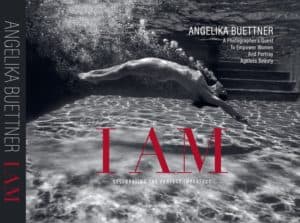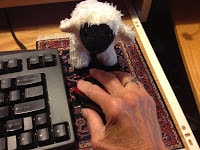Posts Tagged ‘aging’
I AM by Angelika Buettner: celebrating the beauty of aging bodies

“Using my camera to pry deeper into woman’s psyches, I started to photograph timeless beauty, trying to capture what lies beneath the skin, woman’s hidden desires, and hidden conflicts. I am motivated to help women overcome their inhibitions and insecurities about their bodies. I believed if I could persuade enough women to let themselves be photographed naked, I could prove to them and prove to the whole world, ageless beauty does exist. Women over 40 and 50 and 60 and even women in their 80’s and 90’s radiate from within and are beautiful at every age.”
— Angelika Buettner
I AM is a book of nude photographs of 121 women between the ages of 40 and 100, and it’s so much more. Photographer Angelika Buettner celebrates these women — their beauty, wisdom, humor, and audacity. From the first page, this book shines with a celebration of women’s beauty as they age. No makeovers, no retouching: these are women celebrating their time of life — their authenticity, self-acceptance, and joy. I AM kicks at our outdated notion that we age out of beauty and desirability. Quite the contrary, as Angelika Buettner and her 121 brave women illustrate.
Buettner celebrates these women — their beauty, wisdom, humor, and audacity. From the first page, this book shines with a celebration of women’s beauty as they age. No makeovers, no retouching: these are women celebrating their time of life — their authenticity, self-acceptance, and joy. I AM kicks at our outdated notion that we age out of beauty and desirability. Quite the contrary, as Angelika Buettner and her 121 brave women illustrate.
Each page of photographs glows with images of the splendor of aging. The women proudly bare their wrinkles and loose skin; their large breasts, small breasts, breasts  that droop, or maybe no breasts at all. But the point is that they are at home in their bodies, proud and courageous in their skin. What a lesson we can learn from them!
that droop, or maybe no breasts at all. But the point is that they are at home in their bodies, proud and courageous in their skin. What a lesson we can learn from them!
Buettner explains her mission:
It’s been my passion, my intuition, my vision, my desire, my obsession, and my quest to reveal and showcase ageless beauty of women over 40 to make us all more visible. Using my camera as a therapeutic tool and instrument of social commentary, I have attempted to capture, something raw and refined, edgy and elegant, honest and pure. Naked portraits of strong women who dare to step out of their comfort zone…
We, meaning, the women over 40, who are ready to own their sensuality without being sexualized, stand naked and bare it all. There is no judgement involved in how our bodies look when we see into each other’s souls. We accept we are all goddesses.
We are so much more than our bodies.
We can celebrate our pasts, nourish our present selves and relish what our futures will hold.
In Buettner’s words, “Each picture has a story to be told.” Lucky for us, we get glimpses of those stories. Each woman speaks in prose or poetry about what “I AM” means to her personally. For example, this from Ruth, age 100:
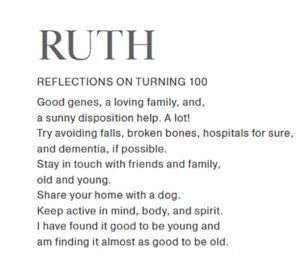
There is great power in this book. If you’re looking for a special Valentine’s gift for a lover or yourself, I urge you to splurge on I AM, a gorgeous book that you’ll be proud to display on your coffee table for all to see. Buettner put 7 years into making this project a reality, and she spared no expense making the finished product stunning — a big book (12″ x 9″ hardcover, weighing 4 pounds) on thick, glossy paper. Purchase it here.
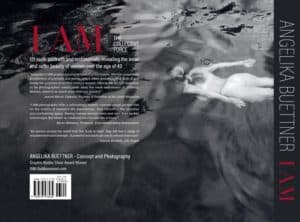
On Turning 76
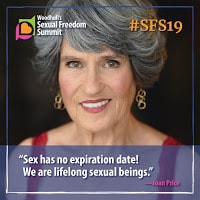 I turn 76 on November 10, 2019. I meant to write this on the eve of my birthday, but I’m rushing it by two weeks. Right now my home is under an evacuation alert because of the huge Kincade fire not far away and projected high winds tonight and tomorrow. The power will go out any minute. The bad air is exacerbating my asthma. Somehow it feels important to write this now.
I turn 76 on November 10, 2019. I meant to write this on the eve of my birthday, but I’m rushing it by two weeks. Right now my home is under an evacuation alert because of the huge Kincade fire not far away and projected high winds tonight and tomorrow. The power will go out any minute. The bad air is exacerbating my asthma. Somehow it feels important to write this now.
This past year has been astonishing, both personally and professionally. Who could have guessed that age 75 would be filled with all of these?

- A new book, Sex After Grief, that helped bring closure to my own grief and let me help others who are grieving;
- Making a film (!) about sex and aging, a project that I never envisioned doing until the lovely jessica drake told me it was time to do it together;
- Speaking events in the US and abroad and much media attention;
- A stimulating and nurturing relationship that delights me every day.
Do you want to know what matters less than I predicted? Wrinkles. Puckered thighs. Loose skin. I hear people bemoan their aging bodies, say they have to cover up. Some tell me they’re giving up sex because they don’t understand why anyone would desire their old bodies. Yes, wrinkles startle us, showing up in places we didn’t expect — even cleavage in a push-up bra! — but hey, our bodies are the youngest they’ll ever be from now on! We can celebrate our bodies, or hate them, or ignore them. Which choice serves us best? We can’t go back in time, but we can go forward accepting ourselves and glorying in our life experience. The more we accept and celebrate ourselves at our age now, the sexier we will feel.
 My view: let’s celebrate the ability of our bodies to move us, to stimulate us, to feel sexual pleasure. And why should we see ourselves as less beautiful or less desirable because we wear our experience on our skin? Isn’t that a badge of living? I’ve been indulging myself with lingerie photo shoots every few years, and I have one scheduled with Perry Gallagher on my 80th birthday. The point is not to show off my body — it’s to accept it and see it with new eyes, and chronicle my aging process.
My view: let’s celebrate the ability of our bodies to move us, to stimulate us, to feel sexual pleasure. And why should we see ourselves as less beautiful or less desirable because we wear our experience on our skin? Isn’t that a badge of living? I’ve been indulging myself with lingerie photo shoots every few years, and I have one scheduled with Perry Gallagher on my 80th birthday. The point is not to show off my body — it’s to accept it and see it with new eyes, and chronicle my aging process.

Joan, Jan. 1980
I’m amazed, actually, at how well my body functions, despite its many health challenges. (You don’t need to know specifics, other than I need 5 medications a day to keep them at bay.) I realized a long time ago that I can’t change what I inherited (family history of early heart disease; a mother who took up smoking during her pregnancy, resulting in my low birth weight and breathing problems since infancy) and what happened to me (auto accident body destruction).
But I can change what I do to keep my health day by day, hour by hour. I’m a fanatic about exercise, tracking my steps and minutes, challenging myself with 1.5 to 2.5 hours a day of fitness activity: teaching line dancing, brisk walking, Pilates. I lead a very busy life, but I always make time for exercise because it gives back more than it takes — my mental acuity and physical energy are charged up by movement, the more the better. I feel lighter in my body when I exercise. I embrace my physicality. That translate to more joy, better sex, and myriad unseen health benefits. Fitness after 50, 60, 70, or 80 – it’s your choice. Start today, don’t put it off any longer.
I wrote the following on Facebook, and I’ll expand on it now:
I often reflect on this: every path taken or not taken, every relationship that starts and/or ends, every life decision — all of these open doors (and windows) to what happens next.
I realize with the perspective of almost 76 years that our paths aren’t linear. They wind around, sometimes end up where we started, but with new knowledge. Or they lead us to a new place entirely. Sometimes the signposts along the way are helpful, other times they’re in a language we don’t know, so we make our best guess.
I think the only mistake we can make is to be afraid of taking a path because we don’t know what’s at the end of it. The truth is, we don’t know where it will take us even if we think we do.
My advice (if you want advice):
- Move as much as possible — your health depends on it.
- Adopt the “if not now, when?” mindset and live your bucket list now.
- If your relationship situation needs changing, change it.
- Put plans in place now that you might need later: financial, healthcare, will, advance directive.
- Take care of things now that you don’t want your loved ones to have to figure out when you’re unable.
- Spend time with friends — we don’t know how long they’ll be with us.
- Tell the people you love that you love them.
- Learn from the past, celebrate the present, be unafraid of the future.
As I wrote this list, I cringed at a few items. I have a list of important and time-consuming tasks I keep putting off because other things seem more urgent and easier to complete. I’ll check in again later once I’ve followed my own advice on those things!
Did anything on my “advice” list resonate with you particularly? If you were giving advice, what would you add to my list? Please comment and include your age.
Senior Sex Research: Here’s what I’d like to know
 7/31/19: I wrote this post in January 2017. I’m bringing it to the top again because this research is still sorely needed, and I don’t see the issues changing. Please feel free to contribute your thoughts!
7/31/19: I wrote this post in January 2017. I’m bringing it to the top again because this research is still sorely needed, and I don’t see the issues changing. Please feel free to contribute your thoughts!
I’m not looking for statistics, such as how many of us are having sex. Doesn’t that depend on (a) how the researchers and the subjects define “having sex” and (b) whether we have what we need (partner, privacy, physical ability, emotional intimacy) to have the kind of sex we want?
I’d like to see research into how we think about sex now, what determines quality of sex, what’s missing in our sexual worlds, what we’re learning about sex and about ourselves during our later years.
So while we’re waiting for the right research to be done, here are some questions for you if you’re over 50, 60, 70 and beyond:
1. If a researcher asked if you are “sexually active,” how would you answer? What would you mean by that answer?
2. How has the definition of “what is sex?” changed or evolved for you over time? What did it used to mean? What does it mean now? What made your definition change (if it changed)?
3. If you could be in any kind of sexual relationship you wanted, what would it be? Never mind how you might be judged — what would be ideal for the real you, maybe the secret you?
4. What would you like to tell our society about sex and aging?
I asked the good folks who follow my Naked at Our Age Facebook page, “If researchers wandered over here to learn what studies we’d like to see conducted about sex and aging, what would you suggest?” Here are some of their suggestions:
- “Studies toward normalizing serial monogamous relationships. As we age, the chances are that we will lose our partner. When that happens, it should be easier to establish new relationships without feeling that we are betraying the partner who has died. We don’t have to give up our former love in order to love another person. I think we can keep the truth and warmth of the past love, have an additional love or two, without feeling that we have violated the truth of the first.”
- “I’d love to see more of an in-depth study on how illness/ disability/ aging affect our sexuality and sex lives.”
- “How about a serious, non-judgmental look at the multi-faceted, complicated reasons for diminished libido as we age? (Hormonal, psychological, physiological.) Why it affects some and not others and methods – again multi-faceted – for those who indeed want to revitalize their libido.”
- “Can ingrained sexual scripts be changed enough so that new ways of ‘having sex’ aren’t seen as less satisfying than former ways?”
- “What is the most effective way to help older adults get on board with safer sex?”
- “The best ways to empower older adults to set, communicate, and respect sexual boundaries.”
- “I’m fascinated by what seems to be a growing popularity of consensual non-monogamy, open marriages, and open relationships in the over 50 crowd. Is this just anecdotal or have others noticed it too?”
- “Re-defining what ‘satisfying sex’ is to align better with how bodies change with age. This could go hand-in-hand with the ever-popular yet hardly discussed question, ‘What is sex?’ It can be so many things.”
- “Seniors discovering and accepting polyamory.”
I’m eager to hear from you, whether you’d like to answer one of my questions or add to the list of what researchers should study. Please post a comment and include your real age.
Let’s keep talking. The conversation has just begun!
P.S. When I invite you to comment, I’m inviting you — real people — to share your personal views. I’m not inviting ads for escort services, ED “cures,” cam sites, or other commercial enterprises. I shouldn’t have to say any of this, but the number of comments I have to delete indicates otherwise. [I know, the trolls and robots aren’t even reading this, but I have to try.]
Why is Sex Better After 50?
If you’re over 50, how is sex better now than in your youthful decades? I don’t mean just the physical part of sex — also your emotional response, ease of communication, less fear, less self-consciousness? I’d love to hear from you.
I asked this on my Naked at Our Age Facebook page, which I hope you’ll visit and “like.” We so often hear aging discussed in terms of what we lose, what hurts, what doesn’t work anymore, what is falling away. But on the glass-half-full side, aging is filled with changes that are beautiful and fulfilling. My question aimed to elicit some of those thoughts, and indeed that happened. Here are some excerpts from readers’ comments:
- Enjoying. Embracing every single moment and soaking it all in. Losing all the inhibitions, life is short and here to be lived. It’s no longer a race but a truly pleasurable shared experience.
- It’s all about the communication. I feel comfortable expressing what I like and talking all about sex.
- Openness, adventure, self acceptance, passion.
- I think by the time you’re in your 50s, you’ve established what you enjoy in a sexual relationship. A person knows what their partner likes, responds to and gives back. In youth you just wing it.
- Not selfish.
- Touch is an integral part of the experience for me and I teach my partner how to touch me and where and I do the same for him. I’m much more excited about exploring than I ever was in my younger days. Yes, much fewer inhibitions especially around my body and my body image. I’m less concerned with having an orgasm (because I can get that on my own) and much more focused on enjoying all the sensations.
- Discovered that trust on all levels is a major aphrodisiac.
- Sex in my 70s is relaxed, playful, fun, unhurried, experimental, and made wonderful by open, easy, frank communication with my partner about what we each do and don’t like. Feelings of closeness and trust form significant parts of the overall experience, and our orgasms are happily extended as we pleasure one another without stress or anxiety or rush. Now is the best age in my entire life for uncomplicated, completely happy, and totally delightful sex!
I hope you’ll want to comment and add your thoughts.
